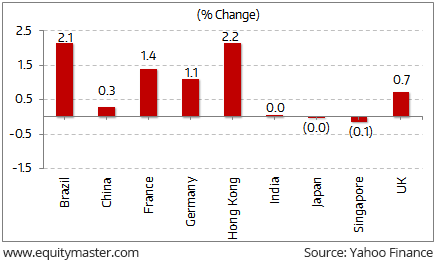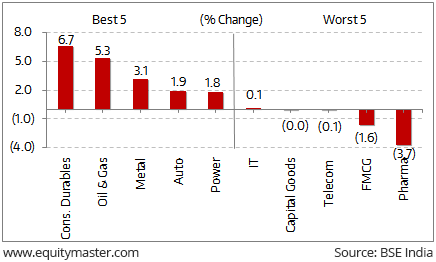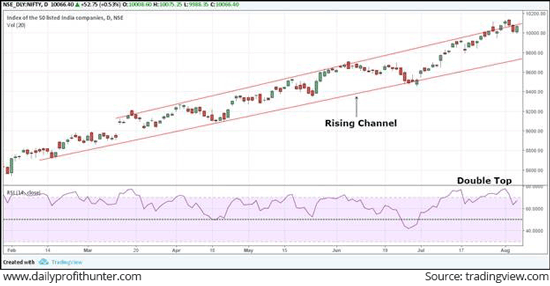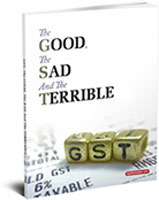- Home
- Todays Market
- Indian Stock Market News August 5, 2017
Global Markets Ends on a Positive Note Sat, 5 Aug RoundUp
Global financial markets ended the week in the green with most of the indices ending in the positive territory. Barring Singapore, India and Japan, all the indices were gainers in the week gone by. The major gains were seen in Hong Kong and Brazil which closed higher by 2.2% and 2.1% respectively.
The share markets in china shrugged off the release of slightly lower-than-expected China PMI data to close higher. In China, official manufacturing PMI for July stood at 51.4, compared to a forecast of 51.6. The July figure was also below June's reading of 51.7.
While manufacturing PMI data tends to be more closely watched, China's pivot toward domestic consumption and away from investment-led growth means the services sector accounts for a bigger slice of the mainland economy. The share market in china closed higher by 0.3% compared to last week.
The Bank of England (BoE) left interest rates unchanged at its monetary policy meet with only two of its monetary policy committee (MPC) members voting in favor of a hike this month. The central bank also left its asset purchase programme unchanged.
The bank rate now remains at 0.25%, along with the asset purchase target at 435 billion pounds and the corporate bond target at 10 billion pounds.
In other news, US services sector data fell more than expected in July. As per the Institute for Supply Management (ISM), non-manufacturing index fell to 53.9 last month from 57.4 in June.
The data stoked doubts over whether the Federal Reserve would raise interest rates again in 2017. The stock markets now believe that its more likely the Fed won't raise rates again this year. Many reasons are put forward for this. US inflation is lower than expected. While the economic conditions could be better, the political situation remains tenuous.
However, with the recent measures at major central banks, it seems that the end of easy money is near. But it would take long before the central banks come to their senses and end this trend.
According to a report by Thompson Reuters Oil Research, crude oil exports by the OPEC rose to record high levels in July. This was driven largely by soaring exports from the group's African members.
For the US, oil production has hit 9.43 million bpd, the highest level since August 2015 and up 12% from its most recent low in June last year. Crude closed the week marginally lower at US$ 49.5 per barrel.
Key World Markets During the Week

Back home, Indian stock markets started the week on a strong note but ended the week on a flat note. The slight correction in the market came as a reaction to RBI's stance on rate cut. While the biggest sectoral gainers were Consumer Durables and Oil & Gas, Stocks from Pharma sector continued to see headwinds and were biggest losers.
BSE Indices During the Week

Now let us discuss some key economic and industry developments during the week gone by
The RBI monetary policy committee (MPC) announced a 25 basis points cut in the policy rate citing a sharp fall in inflation. As per Livemint, RBI noted that there are several uncertainties to the inflation trajectory such as farm loan waiver impact on state finances and maintained the neutral stance of monetary policy.
This is the first rate cut since October 2016 and the interest rate is now at a 6-year low.While a rate cut may lead to some volatility in the share markets today, one would do well to not be affected by the short-term volatility.
At Equitymaster, we do not attempt to predict how and when macroeconomic developments will unfold. Instead, we focus all our energy on understanding the underlying business strength of companies.
In fact, the ValuePro team is always on the lookout for all-weather stocks whose fortunes are not tied to economic cycles.
The introduction of the Goods and Service Tax (GST) has pushed down activity in the services sector to a nearly four-year low in July even as manufacturing activity reels at an eight-and-a half-year low.
The widely-tracked Nikkei Purchasing Managers' Index (PMI) on Thursday showed that PMI for the dominating sector of the Indian economy plunged to 45.9, its lowest level since September 2013.
In June, PMI was at an eight-month high of 53.1.
The Services PMI is the reading of the country's services sector output and is updated monthly. A reading above 50 indicates expansion, while any score below the mark denotes contraction.
According to the survey participants confusion over GST caused a contraction in new work, leading to lower activity. This is in stark contrast to improving demand conditions and marketing efforts leading to a higher share of new work over the past four months.
But despite this slowdown, many expect GST to boost business activity in the long-run.
In our view, GST is a complicated topic, the exact implications of which will be obvious over next few years. Our colleague Vivek Kaul has studied the finer aspects of the GST and predicted what could go right and wrong.
To know more, download his special report - The Good, the Sad and the Terrible (GST)
The RBI, after identifying 12 large accounts for resolution under the bankruptcy code, is likely to take more such steps to tackle the bad loan problem in India.
This comes as the RBI Governor Urjit Patel said that the government and the RBI are working in close coordination to resolve large stressed corporate borrowers and recapitalize PSBs within the fiscal deficit target.
Gross non-performing assets (GNPA) of Indian banks rose from 9.2% in September 2016 to 9.6% in March 2017. GNPA refers to the total value of loans on which interest and principal income has not been received by the bank for more than ninety days. For some banks, the ratio of GNPAs to total lending is more than 20%. This means more than Rs 20 out of every Rs 100 lent is at the risk of not coming back.
The RBI expects the average GNPA ratio to increase to 10.2% by March 2018. It indicated that if macroeconomic conditions worsen, this number could go up.
The problem of bad loans is indeed quite severe and when we compare it with other global peers it looks daunting.
Out of the ten major economies facing NPA problems, India is ranked seventh.
The overhang of bad debts has not only hit the bank's profitability, but has also restricted their loan book growth.
However, the ongoing developments by the government and the RBI comes as a significant step in the long overdue process of recovery of loans choking the banking system.
Bad loan recovery has gathered momentum after years of hesitation since the government empowered RBI to direct banks to take big defaulters through the process prescribed under the Insolvency and Bankruptcy Code (IBC) that specifies timebound resolution.
Just Released: Multibagger Stocks Guide
(2017 Edition)
In this report, we reveal four proven strategies to picking multibagger stocks.
Well over a million copies of this report have already been claimed over the years.
Go ahead, grab your copy today. It's Free.

In another development, according to the Nikkei Manufacturing Purchasing Managers' Index, manufacturing activity in July slowed to 47.9, the lowest level since February 2009 due almost entirely to the introduction of the Goods and Services Tax on 1 July.
Consequently, companies purchased fewer quantities of inputs for use in the production process, leading to an overall decline in holdings of raw materials and semi-finished items.
The reading was significantly lower than the 59.9 seen in June. A score above 50 implies an expansion of activity while one below 50 denotes a contraction.
According to Indian manufacturers, higher tax rates sparked greater cost burdens in July.
However, the outlook remained positive in July because companies are expecting clarity on the GST, which will support growth, the report stated.
Movers and Shakers During the Week
| Company | 28-Jul-17 | 5-Aug-17 | Change | 52-wk High/Low |
|---|---|---|---|---|
| Top Gainers During the Week (BSE Group A) | ||||
| HPCL | 374 | 432 | 15.3% | 440/254 |
| Titan Company | 533 | 610 | 14.6% | 616/296 |
| IOC | 367 | 418 | 13.7% | 451/256 |
| Bata India | 575 | 630 | 9.5% | 636/400 |
| Hero Motocorp | 3,631 | 3,959 | 9.0% | 3,967/2,844 |
| Top Losers During the Week (BSE Group A) | ||||
| Jai Prakash Asso. | 30 | 25 | -14.2% | 30/7 |
| Reliance Communications | 26 | 23 | -12.1% | 55/18 |
| Housing Development Infra | 86 | 76 | -11.8% | 102/52 |
| Hindustan copper | 70 | 62 | -11.1% | 75/50 |
| Godrej Consumers | 1,056 | 961 | -9.0% | 1,084/643 |
Some of the key corporate developments in the week gone by
As per a leading financial daily, Infosys will acquire Brilliant Basics, a London-based product design and customer experience (CX) company, for an undisclosed amount. The acquisition is expected to close during the July- September 2018 quarter.
Infosys has digital studios across Bengaluru, Pune, New York, London and Melbourne. The addition of Brilliant Basics will enhance the company's expertise in the financial services, retail and telecom sectors across Europe and the Middle East.
Since Vishal Sikka has taken over as CEO, Infosys has made four acquisitions in an effort to kick-start its foray into new technology areas such as Cloud computing and use of automation, as well as increase its margins in traditional outsourcing services through the use of modern technologies.
In another development, Tyre maker Ceat Ltd reported a 98.6% decline in its consolidated net profit at Rs 13.8 million for the June quarter due to destocking by trade partners ahead of the goods and services tax (GST) rollout and higher expenses.
The company had posted a net profit of Rs 1.03 billion during the corresponding period of the previous fiscal. Total income during the period also declined to Rs 16.38 billion compared to Rs 16.51 billion in the corresponding quarter of last fiscal.
As per the reports, sales had dropped due to lower offtake by dealers since May in the run-up to the GST rollout. The impact had been felt particularly in the medium and heavy vehicles in the commercial vehicle segments.
As per Hindu Business Line, the company has planned Rs 28 billion expansion plan in multiple locations over the next five years.
Moving on to news from airline stocks. As per an article in The Livemint, India led global markets with a domestic air traffic growth of about 20.3% in June.
However, the very strong upward trend in traffic has slowed since the country's unexpected 'demonetization' in November 2016. India's streak of year-on-year double-digit traffic growth may have ended in June as per International Air Transport Association.
For the first six months of 2017, the industry experienced a 12-year high in traffic growth (7.9%) and a record first half load factor of 80.7%.
Meanwhile, India's aviation industry is on a high-growth trajectory. India's domestic air passenger traffic has almost doubled in the past six years. This is on the back of strong economic growth and emergence of low-fare airlines. Indian carriers have now set their sights on International traffic. Indian carriers have been slowly increasing their market share. It is important to note that foreign carriers still dominate international traffic to and from India.
As per the report by rating agency ICRA, the share of domestic airlines in India's international traffic increased from 30.1% in FY14 to 35.1% in FY17.
Glenmark Pharma announced that it had received final ANDA (abbreviated new drug application) approval from the US Food and Drug Administration (USFDA) for its Acyclovir Ointment.
Acyclovir Ointment, the generic version of Zovirax Ointment, of Valeant International Bermuda, is used for treatment of herpes virus.
As per IMS Health sales data for the 12 months to June 2017, Zovirax Ointment achieved annual sales of approximately US$ 110.3 million.The company's current portfolio consists of 121 products authorised for distribution in the US marketplace and 64 ANDAs pending approval with the USFDA.
Moving on to news from the oil and gas sector. Petroleum major Bharat Petroleum Corporation Ltd (BPCL) announced diversification plans with a focus on venturing into gas business.
The company also announced plans to diversify resources for sourcing fuels as a part of its five-year plan.
BPCL has set a target of a capital expenditure of Rs 1 trillion to be spent on all expansion activities including marketing and refining over the next five years.
As a part of the plan to diversify its procurement and sourcing and to reduce geopolitical risk, the company bought one million barrels each of oil from the US - in two consignments. In a first, the company which is largely dependent on OPEC nations for oil imports, purchased crude from the US.
Moving on to the news from IPO space. The initial share sale offer of Cochin Shipyard was oversubscribed 3.16 times on the second day of the three-day bidding today.
The company has set a price band of Rs 424-432 per share for the initial share sale.
The IPO is a fresh issue of 22.65 million shares, which at the upper end of the price band will fetch the company over Rs 9.8 billion. There is also an offer for sale of 11.3 million shares. At the upper end of the price band, the government, which is selling 10% stake, will raise over Rs 4.9 billion.
The funds will be used to fund two major projects and to improve the existing facilities.
But, do the company's fundamentals justify the price it is asking? Should you subscribe to it? Read on to find out.
Moving on to news from banking sector. As per a leading financial daily, in order to write down non-performing loans and to meet rising Basel III requirements, the public-sector banks (PSU) may need at least Rs 1.9 trillion additional capital over the next two years. Credit rating agency, S&P Global Ratings in its latest report has also noted that the lack of capital will put restriction on the lenders' ability while making haircuts on these loans.
The rating agency said that weak profitability along with rising capital demands from Basel III implementation will also continue to pressure the capitalisation of many of PSU banks and further suggested to look for alternate sources to increase their capitalisation. The report is also expecting that the government's commitment of support to PSU banks will remain in place.
Furthermore, S&P mentioned that weak PSU banks would continue to lose market share to the better-performing private sector banks & profitable PSU banks and non-bank finance institutions or domestic debt capital markets, adding that the banking sector may witness consolidation over time as public-sector banks with lower capitalisation and internal generation of capital could become takeover targets.
And here's an update from our friends at Daily Profit Hunter...
The Nifty 50 Index traded the week on a volatile note. On Monday, it opened the session gap up and rallied 62 points. The positive momentum continued until Wednesday open where the index hit a new life high of 10,137. But for the next two days, the Nifty slipped over 100 points. Finally, on Friday, the index recovered strongly to trade 53 points up and ended the weekly session up by 0.51%. The index is currently trading near its channel resistance line which indicates a limited upside. The RSI indicator also formed a double top pattern. So a correction towards the channel's support line at 9,800 cannot be ruled out. You can read the detailed market update here...
Nifty 50 Index Trades on a Volatile Note

For information on how to pick stocks that have the potential to deliver big returns, download our special report now!
Read the latest Market Commentary



Equitymaster requests your view! Post a comment on "Global Markets Ends on a Positive Note". Click here!
Comments are moderated by Equitymaster, in accordance with the Terms of Use, and may not appear
on this article until they have been reviewed and deemed appropriate for posting.
In the meantime, you may want to share this article with your friends!